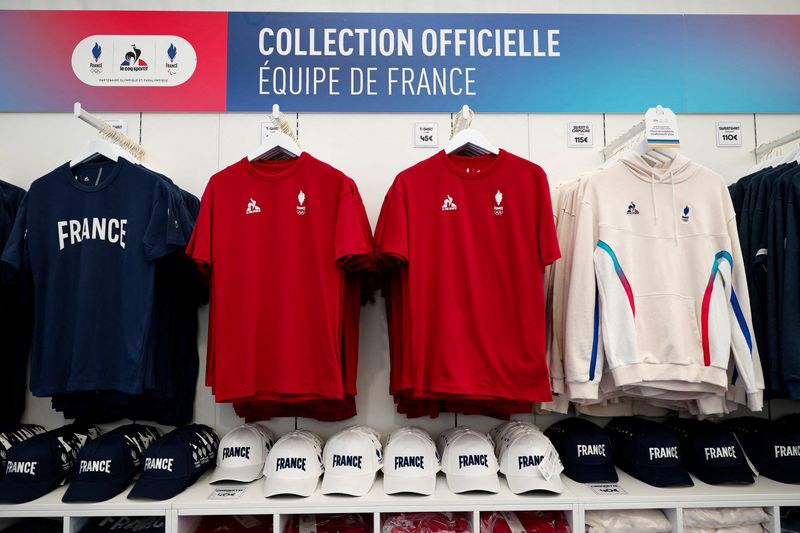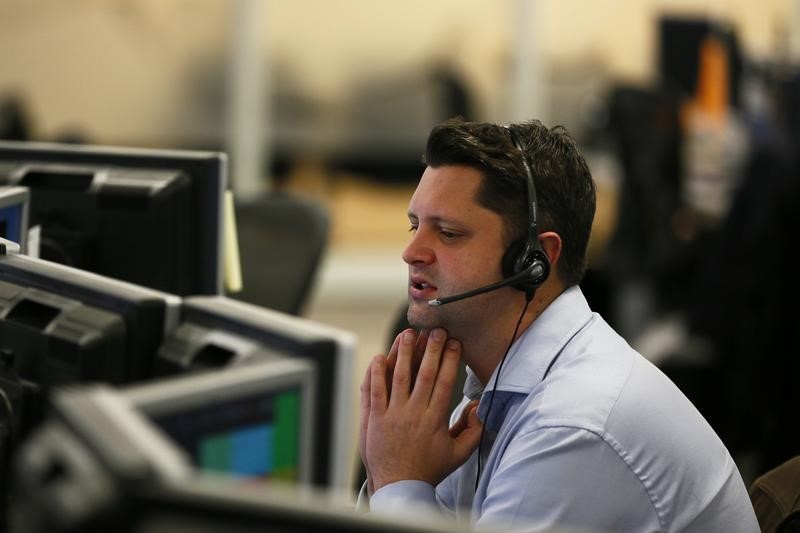By Helen Reid, Layli Foroudi and Mimosa Spencer
PARIS (Reuters) – At the tourist flea market of Saint-Ouen, not far from the Stade de France, where athletes will compete at this summer’s Olympic Games in Paris, police officers flooded in at dawn on April 3 and closed 11 shops selling counterfeit sold bags and shoes.
They seized 63,000 items of clothing, shoes and leather goods, including fake Louis Vuitton and Nike (NYSE:) products, and threw them into garbage trucks on the spot. Ten people were arrested.
Michel Lavaud, chief of police for the Seine-Saint-Denis suburb, which will host Paris athletics and swimming events in 2024 as well as the closing ceremony, described the operation as part of a pre-Olympic crackdown on knockoffs.
Fake fashion is big business. Counterfeit branded clothing alone is estimated to have cost companies in France an average of 1.7 billion euros ($1.83 billion) in lost sales between 2018 and 2021, according to the European Union Intellectual Property Office.
“We have been talking about the problem of counterfeits for the past two years,” Lavaud said, adding that police wanted to intensify their efforts. The raid on the world’s fashion capital bears some similarities to clean-ups carried out by previous Olympic host countries, such as Beijing in 2008, which produced mixed results, as well as London in 2012 and Rio in 2016.
But the police crackdown on street traders in Seine-Saint-Denis, where one in three live in poverty according to French national statistics, has drawn criticism for further exacerbating people already in economically precarious situations .
Axel Wilmort, a researcher at the French social science institute for urban studies LAVUE, said he has noticed a sharp increase in police presence and repression of informal market vendors on the outskirts of Paris over the past three months, with frequent police patrols and the installation of metal barriers that prevent vendors from setting up stalls.
“There is a will to erase all signs of insecurity, poverty and undesirables,” he said, adding that law enforcement officials often fail to distinguish between sellers of counterfeit items and sellers of legitimate second-hand items.
Police in Paris did not respond to a request for comment.
Police have been carrying out raids on informal merchants near Paris’s iconic Montmartre hill since February, with 10 carried out over four days in early June to dismantle a market with around a thousand vendors. Minister of Internal Affairs. Seventy tons of products were destroyed in March alone, the letter said.
Reuters documented in April how street vendors became involved in a massive police operation aimed at ridding deprived Paris suburbs of petty crime before the Games.
LUCRATIVE GAME
The roughly 15 million visitors expected to attend the Paris Olympics — a magnet for luxury goods shoppers — are a tempting target for sellers of knockoff designer goods.
Sensing a threat to branded goods, Paris 2024 organizers and the International Olympic Committee both became members of the French association for the protection of intellectual property UNIFAB last year. The organization works with brands to raise awareness of the risks associated with counterfeit products, which often violate safety regulations and help finance illegal activities.
“We have worked a lot in the run-up to the Olympic Games,” said Delphine Sarfati-Sobreira, CEO of UNIFAB.
Paris 2024 sponsor LVMH, the world’s largest luxury conglomerate, is a prominent member. LVMH did not respond to a request for comment on its recent anti-counterfeiting measures. The company has said it is working closely with authorities and customs officials to enforce its intellectual property rights and protect consumers from counterfeiters.
France had already stepped up its fight against counterfeits. Last year, customs seized 20.5 million counterfeit products, a 78% increase from the 11.5 million seized in 2022, according to data released in May.
This spring, UNIFAB helped train 1,200 customs agents to verify the authenticity of Olympic merchandise, with the red Paris 2024 mascot and clothing the most likely target for illegal replicas, according to officials. French authorities also have 70 agents fighting online counterfeits, aiming to dismantle local and international criminal networks.
“Paris doesn’t want to be known as the counterfeiting capital of Europe,” says intellectual property lawyer John Coldham, a partner at Gowling WLG in London, who worked with brands during the 2012 pre-Olympic Games ‘Fake Free London’. A greater concern for However, French fashion houses may stem from the reluctance of foreign shoppers to visit Paris during the Olympics, rather than from revenue lost to counterfeiting.

Air France-KLM warned last week that it expects a hit of as much as 180 million euros this summer as some foreign tourists avoid the French capital. LVMH and rivals have said they don’t expect a revenue boost from the sporting event and may turn their focus elsewhere.
“Luxury companies are signaling they are ready to host shoppers elsewhere than Paris: from the Cote d’Azur to Milan and beyond,” said Luca Solca, luxury goods analyst at research and brokerage firm Bernstein.


